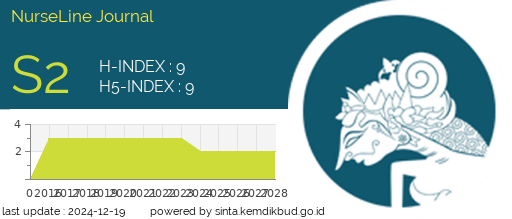Stimulating Development Method to Promote Health in Children with Intellectual Disabilities During the COVID-19 Pandemic Crisis: A Systematic Literature Review
DOI:
https://doi.org/10.19184/nlj.v9i1.46815Keywords:
children with intellectual disabilities, COVID-19 pandemic, stimulating development, systematic literature reviewAbstract
During the COVID-19 pandemic, caregivers and parents play a crucial role in supporting individuals with intellectual disabilities, necessitating adjustments in self-care and the acquisition of essential caregiving skills. Research efforts are focused on developing effective health promotion programs and understanding the pandemic's impacts on individuals with intellectual disabilities, highlighting the importance of systematic literature reviews in synthesizing knowledge for effective caregiving during this crisis. This research aimed to systematically review literature related to stimulating development for health promotion in children with intellectual disabilities during the COVID-19 pandemic crisis. A systematic literature review searched keywords related to variables and sample groups. Data sources were electronic databases, including Scopus, ScienceDirect, Web of Science, and PubMed. The research included studies on the care and health support of individuals with intellectual disabilities over the past 10 years, from September 1, 2021, to January 1, 2022. Among these studies, 8 were selected, focusing on stimulating development and health support for children with intellectual disabilities. The systematic review yielded four programs: 1) Health education in classrooms to promote the health of individuals with intellectual disabilities, 2) Health record registration and health check-ups to promote health, 3) Training with equipment, and 4) Weight reduction and body mass index improvement programs to promote health among individuals with intellectual disabilities. The literature review revealed an increase in knowledge about programs for stimulating development and promoting health in children with intellectual disabilities during the COVID-19 pandemic crisis.
Downloads
References
Bailey, T., Hastings, R.P., Totsika, V., 2021. COVIDâ€19 impact on psychological outcomes of parents, siblings and children with intellectual disability: longitudinal before and during lockdown design. Journal of Intellectual Disability Research 65, 397–404. https://doi.org/10.1111/jir.12818
Doody, O., Keenan, P.M., 2021. The reported effects of the COVID-19 pandemic on people with intellectual disability and their carers: a scoping review. Ann Med 53, 786–804. https://doi.org/10.1080/07853890.2021.1922743
Dooris, M., 2013. Expert voices for change: Bridging the silos towards healthy and sustainable settings for the 21st century. Health Place 20, 39–50.
Hinckson, E.A., Dickinson, A., Water, T., Sands, M., Penman, L., 2013. Physical activity, dietary habits and overall health in overweight and obese children and youth with intellectual disability or autism. Res Dev Disabil 34, 1170–1178. https://doi.org/10.1016/j.ridd.2012.12.006
Inchaiya, C., Matsa, B., Nakboon, S., Ruangwarabun, S., Danakasai, C., Panlaksana, P., 2018. Empowerment and Health Care for People with Intellectual Disabilities: A Lesson in Developing Learning Centers for Health Rehabilitation of People with Disabilities. Nakhon Phanom University Journal 25, 223–231.
Jankowicz-Szymanska, A., Mikolajczyk, E., Wojtanowski, W., 2012. The effect of physical training on static balance in young people with intellectual disability. Res Dev Disabil 33, 675–681. https://doi.org/10.1016/j.ridd.2011.11.015
Keiler, L.S., 2018. Teachers’ roles and identities in student-centered classrooms. Int J STEM Educ 5, 34. https://doi.org/10.1186/s40594-018-0131-6
Kong, Z., Sze, T.-M., Yu, J., Loprinzi, P., Xiao, T., Yeung, A., Li, C., Zhang, H., Zou, L., 2019. Tai Chi as an Alternative Exercise to Improve Physical Fitness for Children and Adolescents with Intellectual Disability. Int J Environ Res Public Health 16, 1152. https://doi.org/10.3390/ijerph16071152
Landes, S.D., Turk, M.A., Ervin, D.A., 2021. COVID-19 case-fatality disparities among people with intellectual and developmental disabilities: Evidence from 12 US jurisdictions. Disabil Health J 14, 101116. https://doi.org/10.1016/j.dhjo.2021.101116
Lee, K., Lee, M., Song, C., 2016. Balance training improves postural balance, gait, and functional strength in adolescents with intellectual disabilities: Single-blinded, randomized clinical trial. Disabil Health J 9, 416–422. https://doi.org/10.1016/j.dhjo.2016.01.010
Lennox, N., McPherson, L., Bain, C., O’Callaghan, M., Carrington, S., Ware, R.S., 2016. A health advocacy intervention for adolescents with intellectual disability: a cluster randomized controlled trial. Dev Med Child Neurol 58, 1265–1272. https://doi.org/10.1111/dmcn.13174
Naophuthon, I., 2020. Development of Activity Kit using the SimSun Learning and Skills Teaching Format to Promote Self-help Abilities in Daily Life for Students with Intellectual Disabilities. Sakon Nakhon Rajabhat University, Sakon Nakhon.
Office of the Health Promotion Fund (ThaiHealth), 2021. Physical Activity Teaching Manual for Parents of Children with Intellectual Disabilities [WWW Document]. https://www.thaihealth.or.th/contact/getfile_books.php?e_id=726.
Owens, J.K., 2021. Systematic reviews: Brief overview of methods, limitations, and resources. Nurse Author Ed 31, 69–72. https://doi.org/10.1111/nae2.28
Rajanukul Institute, 2015. Child Nutrition [WWW Document]. http://www.rajanukul.go.th/iqeq/index.php?mode=nutrition&group_id=0&id=271.
Royal College of Pediatricians of Thailand, T.P.A. of T., 2015. Manual for Assessing, Diagnosing, and Assisting Children with Disabilities. Pentagon Advertising Co., Ltd, Bangkok.
Silalak, S., 2018. Promoting Life Skills and Health Education for Children with Intellectual Disabilities. Journal of Research and Development Institute 5, 195–206.
Stanish, H.I., Temple, V.A., 2012. Efficacy of a Peerâ€Guided Exercise Programme for Adolescents with Intellectual Disability. Journal of Applied Research in Intellectual Disabilities 25, 319–328. https://doi.org/10.1111/j.1468-3148.2011.00668.x
Struyf, T., Deeks, J.J., Dinnes, J., Takwoingi, Y., Davenport, C., Leeflang, M.M., Spijker, R., Hooft, L., Emperador, D., Domen, J., Tans, A., Janssens, S., Wickramasinghe, D., Lannoy, V., Horn, S.R.A., Van den Bruel, A., 2022. Signs and symptoms to determine if a patient presenting in primary care or hospital outpatient settings has COVID-19. Cochrane Database of Systematic Reviews 2022. https://doi.org/10.1002/14651858.CD013665.pub3
Tikeang, W., Sitthisuan, K., Aankhaw, P., 2020. Assessing the Effectiveness of Training Fine Motor Skills Using Tangible Interactive Interface Computer Games for Children with Intellectual Disabilities. Research Journal of Rajamangala University of Technology Srivijaya, 12, 433–446.
Vlot-van Anrooij, K., Naaldenberg, J., Hilgenkamp, T.I.M., Overwijk, A., van der Velden, K., Leusink, G.L., 2022. Gaining actionable knowledge to improve local health-promoting capacities in long-term care support settings for people with intellectual disabilities. Patient Educ Couns 105, 407–415. https://doi.org/10.1016/j.pec.2021.05.033
Willner, P., Rose, J., Stenfert Kroese, B., Murphy, G.H., Langdon, P.E., Clifford, C., Hutchings, H., Watkins, A., Hiles, S., Cooper, V., 2020. Effect of the COVIDâ€19 pandemic on the mental health of carers of people with intellectual disabilities. Journal of Applied Research in Intellectual Disabilities 33, 1523–1533. https://doi.org/10.1111/jar.12811
Wu, W.-L., Yang, Y.-F., Chu, I.-H., Hsu, H.-T., Tsai, F.-H., Liang, J.-M., 2017. Effectiveness of a cross-circuit exercise training program in improving the fitness of overweight or obese adolescents with intellectual disability enrolled in special education schools. Res Dev Disabil 60, 83–95. https://doi.org/10.1016/j.ridd.2016.11.005









